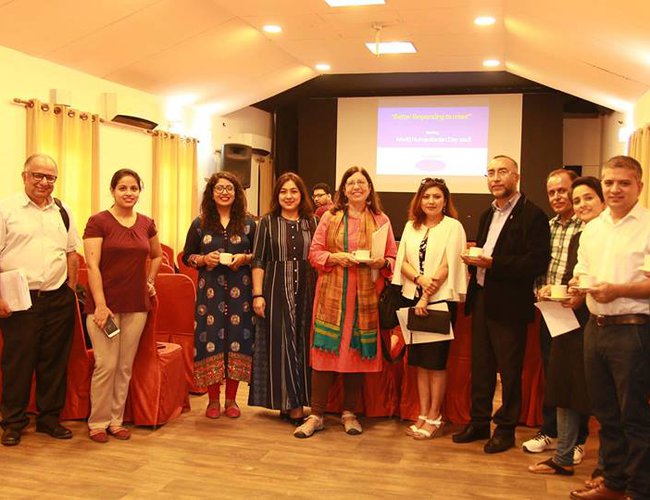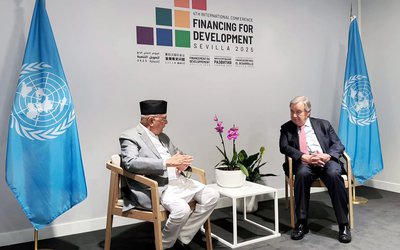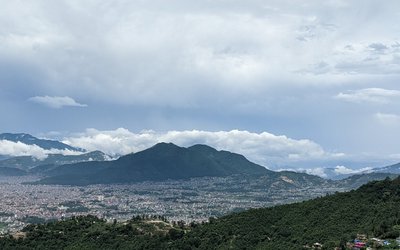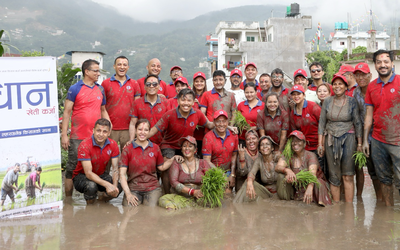
As Nepal continues to celebrate the Social Service Day on September 21, NGOs and INGOs, which have contributed immensely in Nepal’s development sector, are facing hardships.
In a recent interaction, officials of the Association of International NGO’s (AIN) in Nepal said that the budget from AIN affiliated INGOs for 2017/018 was US$ 335,137,934, they were working in seven provinces and reached 26,029,318 people.
Out of over 200 INGOs, 90 paid Rs.845,901,301 in taxes. AIN-affiliated 142 INGOs in Nepal employed 5613 Nepali and 200 international personnel. These figures do not include volunteers and consultants. The money, brought by INGOs, go to 25 major sectors.
However, after Prime Minister KP Sharma Oli formed his government with a two-thirds majority, the communist government has taken some major decisions, which will ultimately bar the civil society organizations from work.
Initially, many considered this government will come up with reforms and saw placing NGOs and INGOs under the prime minister’s office as a positive deal. However, the situation has turned sour when Social Welfare Council started behaving differently, seeking to implement many conditions to renew and permit NGOs and INGOs. Several ministries came up with a number of different directives.
Guidelines issued by Ministry of Federal Affairs and General Administration bar local bodies to directly deal with NGOs and INGOs. Now local levels need the permission from the Social Mobilization and NGO Coordination Section of the ministry to deal with NGOs and INGOs.
Formulated by the Ministry of Home Affairs, the other directives mandate central and district level cross-agency committees to keep a close watch on community based organizations and foreign nationals and take them under control if they are found involved in suspicious or illegal activities.
Although it is yet to be made public, the new foreign aid policy, which is at the final stage of writing, has so many provisions, which are likely to create difficulties for NGOs and INGOs working in Nepal.
Social Welfare Council, the government’s NGO monitoring body, admits that limited resources have made monitoring difficult. “Some 44,000 NGOs have been registered with the council, and possibly as many as 100,000 exist overall. During the registration and renewal process, SWC collects details of the programs being run and the hires made, but although they have a mandate to coordinate, monitor, and evaluate, the resources simply aren’t there,” said Hari Odari of the council justifying the new direction.
However, experts have voiced concerns about the recent policy that may restrict and, in some cases, even prevent international NGOs from working in Nepal in the future.
INGO reaction
The latest proposals have drawn skepticism, disbelief, and concern from INGOs working in Nepal, with some saying that an implementation of the policy in its current form might lead to a standstill in international development activities in the country.
“If this takes effect the way it is written right now, many of us might as well just pack our bags and go home,” said Bernd Schäfer, Nepal country director at Caritas Switzerland.
Schäfer said he was worried that inflated reporting to the government would lead to additional administrative tasks, which might deter smaller NGOs from working inside Nepal — and that it could even encourage corruption.
“I already need 12 or 13 stamps in order to get my visa extended. At Caritas, we adhere to the procedures rigorously, but you have to ask if at some point some people just prefer to take a shortcut,” he added.
Shibesh Regmi, country director at Ipas Nepal, an NGO that provides advocacy, training, and education in the field of abortion, also pointed out that the implementation of the new policy wouldn’t only put extra strain on INGOs — it would also affect the government.
“The government doesn't have the capacity to read all the reports by 140 INGOs associated with the Association of International NGOs in Nepal. That capacity doesn't exist. If the reports pile up on somebody's desk, people will miss deadlines, etc.,” he said.
A question of advocacy
One of the policy points that has met with the most resistance is that INGOs should not be involved in rights, policy, and advocacy work in Nepal. For many INGOs, this touches the essence of their presence and work in Nepal.
“By virtue of their definition, INGOs have to have freedom of association and freedom of speech. They should be there so that the government of Nepal complies with human rights and the international treaties it has entered,” Regmi said.
Other NGO workers argued that the government of Nepal is happy to receive funds from overseas to treat the symptoms, but doesn’t want to be told how to address the underlying causes of social, economic, and environmental development issues.
Caritas’ Schärer also said that banning advocacy work could make donors think twice if they wanted to expand operations in the country.
“It doesn’t apply to us right now, but just look around. Isn’t this just about 50 percent of INGOs came here for?” he said.
Some organizations agree that there need to be better regulations of the sector. But many also fear that the policies will be used haphazardly to remove organizations that draw the government’s ire with little reason.
Although INGOs and NGOs have made enormous contributions in the social transformation, supporting programs to directly benefit the poor and marginalized community, the recent guidelines issued by various ministries are likely to restrict their roles, hampering the programs directed to uplift the poor.
- MELAMCHI WATER SUPPLY: No Interruption During Monsoon
- Jun 25, 2025
- KOREAN RETURNEES: Successful Integration
- Jun 25, 2025
- UPPER TRISHULI-1: Engaging With Local
- Jun 25, 2025
- IME GROUP: Twenty Five Years Of Journey
- Jun 24, 2025
- NEPAL’S AIR POLLUTION: A Growing Health Concern
- Jun 24, 2025















